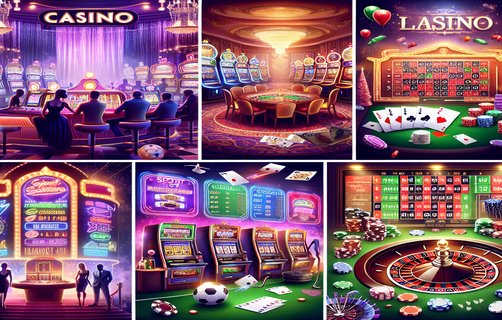Beyond the Table: Mastering Poker Strategy and Emotional Intelligence
पौकर की दुनिया: रणनीति और भावनात्मक बुद्धिमत्ता में महारत हासिल करना
In the world of poker, where the stakes are high and the competition fierce, a strategic approach goes hand in hand with emotional intelligence. Players often focus solely on the cards they hold, but the real game happens beneath the surface. Understanding odds, managing bankrolls, and making informed decisions are all essential tasks, alongside maintaining clarity of mind and emotional focus.
**Odds Formulation Planning**: To excel at poker, the first step is mastering odds formulation. Players must learn how to calculate the likelihood of winning based on the cards on the table and their hand. This involves assessing pot odds to determine if the potential reward justifies the risk of continuing with a hand. Successful players incorporate this into their daily practice to make informed decisions. For example, if the pot holds $200 and your call is $20 with a 20% chance of winning, the expected value should direct your next move.

**Common Betting Missteps Management**: Many players fall into the trap of emotional betting, often influenced by a desire to chase losses or capitalize on fleeting wins. This leads to significant misjudgments in betting amounts and timing. Keeping track of previous betting patterns and recognizing when emotional states sway decision-making can curtail these pitfalls. Analyzing betting behaviors, implementing 'cool-down' periods, and reflecting on hands post-game can facilitate a stronger grip over one’s approach.

**Short-Term Goals**: Identifying and setting short-term goals are crucial for maintaining motivation and tracking progress. For example, rather than just seeking to win a certain amount of money, one might aim to improve decision-making in specific scenarios or build a consistent strategy over a month. Each small victory contributes to a long-term mindset that is vital for sustainable success.
**Emotional Clarity and Focus**: Emotional intelligence plays a vital role in poker. The ability to read opponents, to know when to fold versus when to push aggressively, is paramount. Players must hone their focus and remain calm, especially during tense moments. Practicing mindfulness or visualization techniques before entering a game can enhance emotional clarity, supporting better decision-making under pressure.
**Bankroll Management Techniques**: One of the cornerstones of successful poker playing is effective bankroll management. Establishing a budget, tracking wins and losses, and setting aside a portion of profits for future play ensures that players can continue enjoying the game without financial stress. It’s common for players to become overly ambitious, risking too much of their bankroll in one go – a practice that can lead to swift ruin.
**Player Decision Choices**: Understanding the existing table dynamics is just as important as your own cards. Recognizing how opponents operate can aid in adjusting your strategy in real-time. Are they aggressive, passive, or unpredictable? Modify your play style to either counteract their strategies or to exploit weaknesses. This adaptability is a hallmark of a truly skilled poker player.
In summary, poker isn’t merely a game of cards; it embodies a complex interplay of strategy, emotion, and psychology. By embracing odds formulation, managing emotions, setting realistic goals, and approaching bankroll management with discipline, players can elevate their game. The poker table transforms into a space not just for winning money, but for personal development and mastery of a nuanced skill set.
पौकर की दुनिया में, जहां दांव ऊंचे होते हैं और प्रतियोगिता कड़ी होती है, एक रणनीतिक दृष्टिकोण भावनात्मक बुद्धिमत्ता के साथ मिलकर काम करता है। खिलाड़ी अक्सर केवल उन पत्तों पर ध्यान केंद्रित करते हैं, जो उनके पास होते हैं, लेकिन वास्तव में खेल सतह के नीचे होता है। संभावनाओं को समझना, बैंकroll का प्रबंधन करना और सूचित निर्णय लेना सभी आवश्यक कार्य हैं, साथ ही साथ मन की स्पष्टता और भावनात्मक ध्यान बनाए रखना।
**संभावना की योजना बनाना**: पौकर में उत्कृष्टता प्राप्त करने के लिए, पहला कदम संभावना के निर्धारण में महारत हासिल करना है। खिलाड़ियों को यह सीखना चाहिए कि टेबल पर कार्ड और उनके हाथ के आधार पर जीतने की संभावना को कैसे गणना करना है। इसमें पॉट ऑड्स का आकलन करना शामिल है ताकि यह निर्धारित किया जा सके कि संभावित पुरस्कार जोखिम उठाने के लिए उचित है या नहीं। सफल खिलाड़ी इसे अपनी दैनिक प्रथा में शामिल करते हैं ताकि सूचित निर्णय ले सकें। उदाहरण के लिए, यदि पॉट में $200 हो और आपका कॉल $20 है जिसकी जीतने की संभावना 20% है, तो अपेक्षित मूल्य आपके अगले कदम को मार्गदर्शित करना चाहिए।
**सामान्य बैक्टिंग गलतियों की प्रबंधन**: कई खिलाड़ी भावनात्मक बॉटिंग के जाल में फंस जाते हैं, अक्सर हानियों की खोज या तात्कालिक जीत पर लाभ उठाने की इच्छा से प्रभावित होते हैं। इससे दांव की राशि और समय पर महत्वपूर्ण गलत निर्णय होते हैं। पिछले बैटिंग पैटर्न को ट्रैक करना और पहचानना कि कब भावनात्मक स्थितियाँ निर्णय लेने में स्थानांतरित होती हैं, इन गिरावटों को सीमित कर सकता है। खेल के बाद हाथों पर विचार करना सहायता कर सकता है।
**छोटे लक्ष्यों**: छोटे लक्ष्यों को पहचानना और निर्धारित करना प्रेरणा बनाए रखने और प्रगति को ट्रैक करने के लिए महत्वपूर्ण है। उदाहरण के लिए, केवल एक निश्चित राशि में जीतने का प्रयास करने के बजाय, कोई विशेष परिदृश्यों में निर्णय लेने में सुधार करने या एक महीने में लगातार रणनीति बनाने का लक्ष्य रख सकता है। प्रत्येक छोटी जीत दीर्घकालिक मानसिकता में योगदान करती है, जो स्थायी सफलता के लिए महत्वपूर्ण है।
**भावनात्मक स्पष्टता और ध्यान**: भावनात्मक बुद्धिमत्ता पौकर में एक महत्वपूर्ण भूमिका निभाती है। प्रतिकूलों को पढ़ने की क्षमता, फोल्ड करने या आक्रामकता से धकेलने का सही समय जानना अत्यंत आवश्यक है। खिलाड़ियों को ध्यान केंद्रित करना चाहिए और विशेष रूप से तनावपूर्ण क्षणों के दौरान शांत रहना चाहिए। खेल में प्रवेश करने से पहले ध्यान या दृश्यता तकनीकों का अभ्यास करने से भावनात्मक स्पष्टता में वृद्धि हो सकती है, जिससे तनाव के तहत बेहतर निर्णय लेने में मदद मिलती है।
**बैंकroll प्रबंधन तकनीक**: सफल पौकर खेल की एक आधारशिला प्रभावी बैंकroll प्रबंधन है। एक बजट स्थापित करना, जीत और हानियों का ट्रैक रखना, और भविष्य के खेल के लिए लाभ का एक हिस्सा अलग करना यह सुनिश्चित करता है कि खिलाड़ी बिना वित्तीय तनाव के खेल का आनंद ले सकें। खिलाड़ियों के लिए यह आम है कि वे अत्यधिक महत्वाकांक्षी बन जाएं, एक बार में अपने बैंकroll का बहुत अधिक जोखिम उठाएं - जो एक तेज गति से बर्बादी की ओर ले जाता है।
**खिलाड़ी के निर्णय विकल्प**: मौजूदा टेबल की गतिशीलता को समझना उतना ही महत्वपूर्ण है जितना कि आपके अपने कार्ड। यह पहचानना कि विरोधी निपटाने के लिए कैसे काम करते हैं, वास्तविक समय में अपनी रणनीति को समायोजित करने में मदद कर सकता है। क्या वे आक्रामक हैं, निष्क्रिय हैं या अप्रत्याशित हैं? अपने खेलने के तरीके को अनुकूलित करें ताकि या तो उनकी रणनीतियों का प्रतिरोध किया जा सके या कमजोरियों का फायदा उठाया जा सके। यह अनुकूलन एक सच्चे कौशल वाले पौकर खिलाड़ी की निशानी है।
सारांश में, पौकर केवल एक कार्ड का खेल नहीं है; यह रणनीति, भावना, और मनोविज्ञान का एक जटिल अंतःक्रिया है। संभावित योजना अपनाकर, भावनाओं का प्रबंधन करके, यथार्थवादी लक्ष्य निर्धारित करके, और बैंकरोल प्रबंधन के प्रति अनुशासन के साथ दृष्टिकोण अपनाकर, खिलाड़ी अपने खेल को ऊंचा उठा सकते हैं। पौकर टेबल एक ऐसी जगह में बदल जाती है, न केवल पैसे जीतने के लिए, बल्कि व्यक्तिगत विकास और एक जटिल कौशल सेट में महारत के लिए।

comments
PokerGuru22
This article really highlights the psychological aspect of poker, which is often overlooked!
AceOfSpades
Great tips on bankroll management! Definitely going to implement some of these techniques.
RiverQueen
I love the idea of setting short-term goals. It makes the game more enjoyable and less stressful.
BluffMaster99
Interesting take on emotional clarity; mindfulness before a game is something I haven’t tried yet.
ChipStackSlinger
Really useful insights! I tend to impulsively chase losses, and this has opened my eyes.
FullHouseFan
The emphasis on reading opponents is vital! Adapting your strategy can make all the difference.